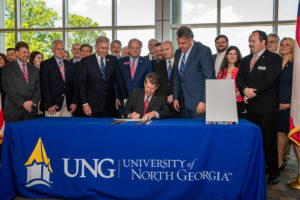2019 – SENATE BILL 2

Gov. Brian Kemp signed Senate Bill 2 in to law on April 26, 2019, during an event held at the University of North Georgia in Dahlonega.
In 2019, the Georgia legislature passed and Gov. Brian Kemp signed into law Senate Bill 2, giving EMCs the legal ability to provide broadband services.
Championed by Sen. Steve Gooch (R – Dahlonega) and the late Rep. Jay Powell (R – Camilla), Senate Bill 2 provides legal clarity to Georgia’s EMCs, giving them the ability to consider how they can participate in efforts to improve broadband access in their respective communities.
Removing barriers for the expansion of broadband to rural Georgia has become a top priority for state lawmakers, recognizing that a lack of high-speed internet is a barrier to quality education, economic development, telemedicine and improved quality of life for many Georgians. Without access, new and growing businesses, entrepreneurs and others are likely to flee areas that lack broadband, putting rural Georgia at a tremendous disadvantage.
While lawmakers, business leaders and opinion leaders agree broadband is one important element that could help put rural Georgia on the path to prosperity, the cost to build fiber networks combined with rapidly changing wireless technologies creates significant challenges for extending broadband service to the expansive and lesser populated areas of the state. For that reason, each of the 41 EMCs in Georgia will need to work with their board and members to explore the potential challenges and opportunities in their respective communities.
Some EMCs may find offering broadband directly to members is not feasible due to operational or budgetary challenges. Others will likely rely on partnerships with established companies and existing providers rather than provide direct-to-consumer broadband services. And in some cases, many of an EMC’s members may already have high-speed internet service. Regardless, the passage of Senate Bill 2 encourages continued dialogue among a variety of stakeholders to identify the best and most efficient way to expand broadband service.
